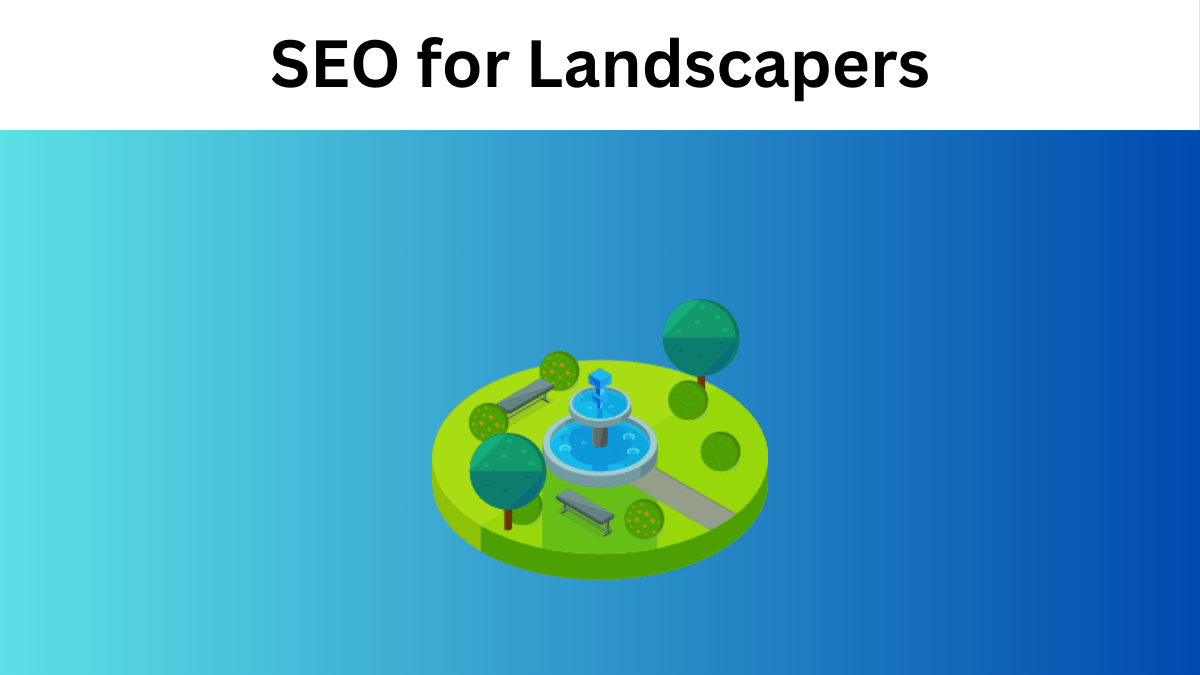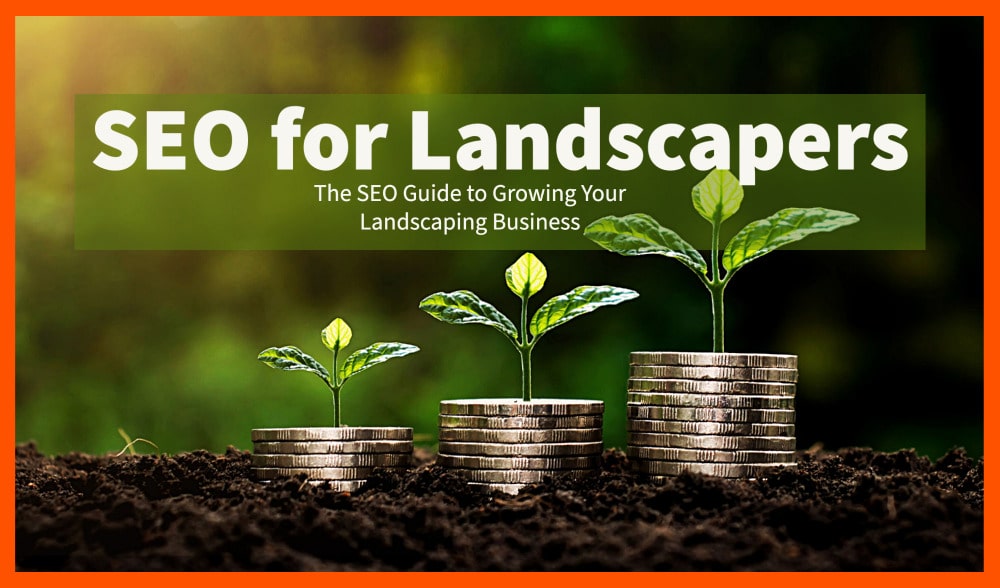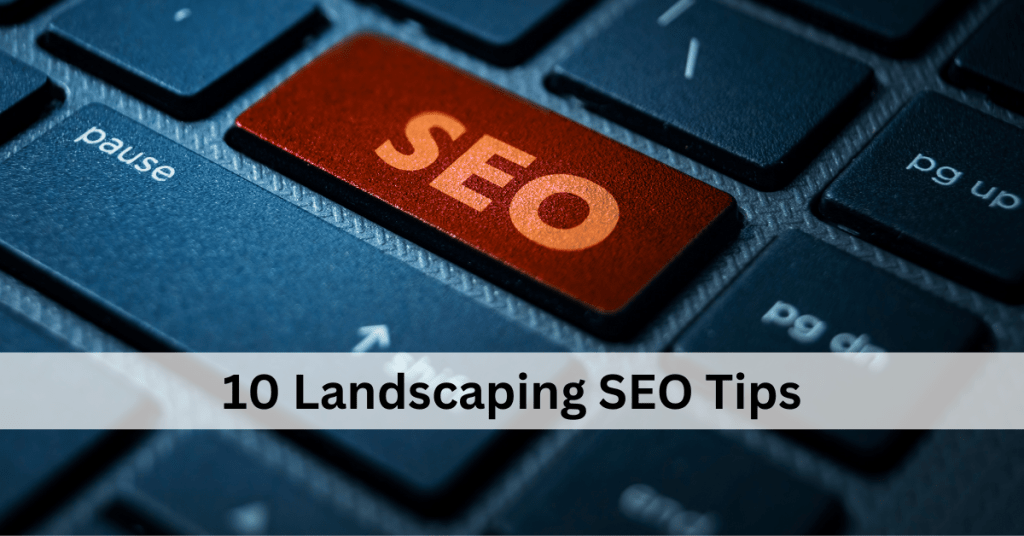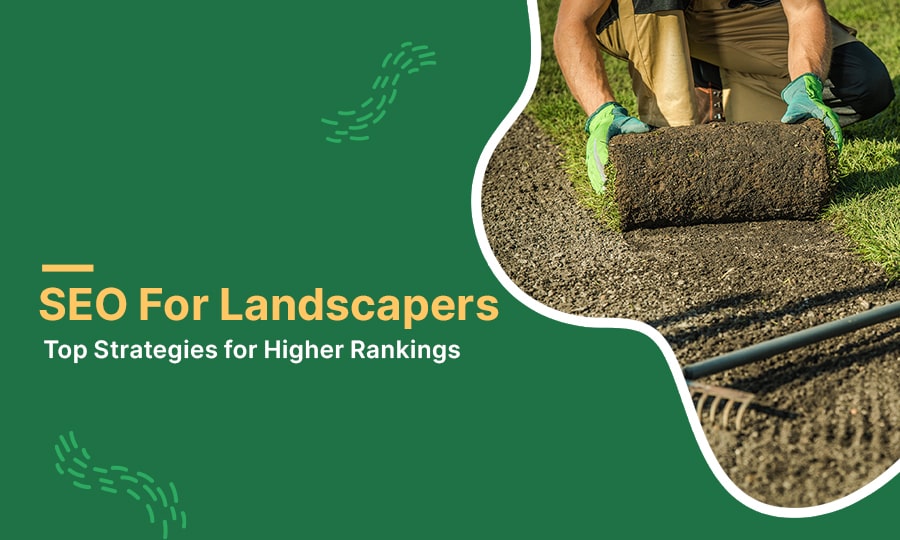In today’s competitive landscaping industry, SEO for Landscapers is essential for increasing visibility and attracting new clients. By optimizing your website for search engines like Google, you’re not just improving your ranking, but also helping potential clients find you quickly when they search for relevant terms like “landscaping companies near me” or “lawn care services.” Effective SEO enables your landscaping business to stand out, reach more customers, and build credibility in the market.
At OctopusWriters, we’re here to guide you through every step of SEO for landscapers, from essential techniques to advanced strategies. In this article, you’ll discover how to use keyword research, local SEO, site structure, and other proven tactics to attract clients and grow your business.
What Is Seo For Landscapers?
SEO for Landscapers focuses on helping landscaping companies appear prominently in search engine results, particularly for local searches. By creating optimized, location-focused content and enhancing website structure, landscapers can increase their visibility to clients actively seeking their services.

A successful SEO strategy for landscapers often includes optimizing local directories, using relevant keywords, and refining site structure to attract the right leads. Over time, SEO for landscapers builds credibility in both local and national search rankings, connecting businesses with a wider audience and driving growth.
What Do You Need Seo?
OctopusWriters highlights the value of improving your content regularly, both old and new, to increase traffic and visibility. This is especially important for landscaping companies in a growing market, where the industry in the U.S. is set to hit almost 183 billion dollars in 2024 and over 221 billion dollars by 2029.
Wondering if SEO could help your business? Here are some typical challenges we see in the landscaping industry:
You Don’t Have Google Maps Listings For All Your Locations
Ensuring that all your landscaping business locations appear on Google Maps is crucial for reaching local customers. If your business isn’t showing up when clients search “landscaping services near me,” it may be time to refine your local presence. With 97% of consumers looking online for nearby businesses, being visible in these searches is key.
An effective SEO for landscapers plan includes optimizing your Google Business Profile and website to improve your ranking in Google’s Local Map Pack. By securing a spot in this valuable area, you make it easier for local customers to find your services, giving your business a stronger presence in the community.
You Aren’t Competing Locally With Other Landscaping Companies
Local SEO strategies target specific regions, which is particularly beneficial for landscaping companies aiming to grow their local customer base. With an SEO for landscapers approach, we customize our strategies to match the unique needs of your business. From optimizing Google Business Profile listings to creating targeted location pages and managing spammy Google Maps entries, our approach helps make your business stand out.

You Aren’t Collecting Reviews Online
In SEO strategies for landscaping companies, we advise encouraging client reviews on your Google Business Profile. With nearly 82% of consumers relying on local business reviews and 86% using Google Maps for nearby searches, a strong review portfolio can help landscaping companies stand out in local search results.
Our findings show that a steady stream of positive reviews improves your business’s rankings, builds trust, draws in leads, and ultimately helps your landscaping services gain better visibility and more traction in the local market.
Your Websites Load Time Is Too Slow
“Did you know that 83% of users want a website to load in 3 seconds or faster?”
This means that website speed is a fundamental part of user experience. If a page takes too long, users might move on to a competitor’s site. To retain visitors and improve engagement, make sure your website is optimized for speed and efficiency.
You Haven’t Cleaned Up Your Citations
Today, various online platforms function like the traditional Yellow Pages once did. For landscaping businesses, updating any new address or contact details across these platforms is essential. Ensuring consistency in business information across online directories can be pivotal in local search visibility, so potential clients find your services with ease.
For those considering SEO for landscapers, here are some insightful statistics showing the long-term benefits of a strong digital presence:
- 70% of Google searches use long-tail keywords. With an optimized blog for your landscaping business, you can tap into these keywords, boosting visibility and positioning your company as an authority.
- While most websites have 10 to 25 pages, sites with 401 to 1,000 pages attract 9 times more traffic than those with 51 to 100. More diverse content allows for better keyword targeting and a broader reach in showcasing your landscaping services.
- Optimizing for specific terms pays off. For example, the keyword “lawn maintenance” has about 9.2K monthly searches in the U.S., making it a valuable keyword for targeted content.
- Backlinks remain a vital part of SEO for landscapers, especially for highly competitive terms. Ranking for complex keywords, like “how much does landscaping cost,” often requires strong backlink profiles to break onto the first page of Google.
- Testimonials are highly trusted—88% of customers consider online reviews as reliable as personal recommendations. Highlighting these on your site boosts customer confidence.
- With 80% of people searching for landscaping services without a specific company in mind, SEO can give you an edge in a crowded market.
- “Near me” keywords continue to rise, with “landscaping near me” seeing 65% growth year-over-year. This demonstrates the importance of local SEO strategies for landscapers.
Why Invest In Landscaping Seo Services?

With the digital age here to stay, having a solid online presence is essential. Here are some reasons why focusing on SEO can make all the difference for your landscaping company:
- A Direct Path to More Leads: With millions of searches happening on Google daily, showing up in search results is an invaluable way to connect with potential clients. SEO can drive highly targeted traffic to your site, translating to more leads and growth for your business.
- Building Trust Through Visibility: Being on the first page of Google doesn’t just mean better visibility; it signals to potential clients that your landscaping company is a trusted authority. This credibility can play a significant role in influencing customers to choose your services.
- Future-Proofing Your Marketing Efforts: SEO isn’t a fleeting trend—it’s an ongoing digital strategy. As more clients continue to rely on online searches, optimizing for search engines helps keep your business competitive and ensures long-term visibility in an increasingly digital world.
Terms To Know When Navigating A Landscaping Seo Strategy
We understand that knowing the essentials of SEO for landscapers can make a huge difference in effectively reaching your audience. Here’s a quick breakdown of important terms in SEO for landscaping companies:
- On-page SEO: This type of SEO covers everything on your website that impacts search engine rankings, including keywords, metadata, internal linking, and images. By optimizing these on-page elements, your site becomes more search-friendly and user-focused.
- Off-page SEO: Off-page SEO includes actions outside of your site that strengthen its authority. Building high-quality backlinks, managing local citations, and maintaining local profiles all contribute to a stronger online reputation and can increase relevant site traffic.
- Technical SEO: This SEO area tackles the behind-the-scenes aspects of your website, such as mobile optimization, page speed, and security. Ensuring strong technical SEO allows search engines to crawl and rank your site efficiently.
- Local SEO: Local SEO is key for landscaping companies. It focuses on reaching customers in your specific service areas using localized keywords like “landscaping services in [city]” to rank higher for searches made by nearby users.
- Metadata: Metadata includes title tags, meta descriptions, and headers that summarize a page’s content for search engines. It’s what shows up in search results, making it essential for ranking and attracting clicks.
- Long-tail Keywords: These are detailed, multi-word phrases that pinpoint specific search intent. With lower competition, long-tail keywords are effective in driving highly interested leads to your site.
- Alt Text/Tags: Alt text describes images for search engines and users who use accessibility tools. It helps with SEO by providing context, ensuring that visuals contribute to your site’s relevance.
- Internal Linking: This links one page of your website to another, guiding users and helping search engines understand the structure and hierarchy of your content. It’s crucial for boosting page authority and enhancing navigation.
- Indexed Page: An indexed page is one that search engines like Google have crawled and saved. Only indexed pages can show up in search results.
- SERP (Search Engine Results Page): The SERP is the page of results shown after a user submits a query on search engines. High SERP rankings are essential for better visibility and click-through rates.
With these SEO for landscapers terms in mind, OctopusWriters is here to support your landscaping business in developing a strategic approach, connecting with local customers, and driving measurable growth in search rankings.
10 Tips For Starting Seo For Landscapers

Find Relevant Keywords To Appear In The Right Search Results
The first essential step in SEO for landscaping companies is identifying relevant keywords. The keywords you choose influence where your landscaping business appears in search results, so optimizing your site for industry-specific terms is key to ranking in the right searches.
To find the most effective keywords, we employ advanced keyword research to generate a list of terms that align with your services and location. We recommend focusing on long-tail keywords, or phrases with three or more words, such as “landscaping company in Newark, DE.” Long-tail keywords are particularly valuable for SEO because they are specific, meaning users searching these terms are likely more interested in your business if it matches their search.
For instance, someone searching “tree removal services in Newark, DE” has a clear intent and location in mind, unlike a more generic search like “tree removal,” which could apply to anything.
Once we’ve identified optimal long-tail keywords, OctopusWriters ensures they’re seamlessly integrated throughout your site. This approach helps improve your ranking while avoiding keyword stuffing, which could otherwise harm your SEO efforts. Our goal is to provide a well-rounded, keyword-optimized foundation for your landscaping company’s SEO success.
Optimize Title Tags And Meta Descriptions To Compel Searchers To Click
In SEO for landscapers, optimizing title tags and meta descriptions is fundamental. These snippets serve as your first interaction with potential clients in search results. Well-written tags encourage clicks and help search engines understand your page’s relevance.
For title tags, focus on:
- Making it engaging and competitive
- Starting with the primary keyword
- Keeping it within the 60-character limit
- Adding words that generate interest (such as “essential,” “insider,” or “complete”)
In the meta description:
- Naturally integrate the primary keyword
- Offer a quick summary to help users understand the content
- Stay within 155 characters to maintain clarity
Properly optimized tags lead to better rankings and make your listing more appealing, drawing in more site visitors and potential customers.
Claim Your Google Business Profile Listing To Drive Local Leads
An effective step for SEO for landscaping companies is claiming and optimizing your Google Business Profile (GBP) listing. This listing shows up prominently in local search results, increasing your chances of appearing in the “local SEO 3-pack,” which is essential for capturing leads from nearby clients.

Start by claiming your GBP listing and verifying that essential details are accurate:
- Business name (use the full official name, such as “Smith’s Landscaping Solutions” rather than just “Smith’s Landscaping”)
- Physical address
- Primary contact number
With these basics in place, further optimize your profile by adding a short business description, specifying your hours, and linking to your website. Adding visual appeal is key; companies with over 100 photos get significantly more engagement, including 520% more calls and 1065% more website clicks. Showcase images of completed projects, your team, and any unique landscaping services offered.
This comprehensive optimization of your GBP listing will make your business more visible in local searches, improving your SEO for landscaping company searches and helping you connect with the local customers who need your services.
Create Content To Drive Valuable Leads To Your Site
Content creation is essential for effective SEO for lawn care companies. By producing valuable content, you draw in an audience actively seeking landscaping insights, allowing your business to be a trusted source of expertise in the industry. Establishing your authority through informative content can attract leads and create a lasting impression that leads to higher conversions.
Types of content that work well include:
- Blogs
- Video tutorials
- How-to guides
- Ebooks
- Infographics
- Podcasts
Offering a variety of formats keeps your strategy dynamic and ensures you reach different types of readers. Ensure your content addresses topics specific to landscaping and lawn care to drive the right kind of traffic to your website. To refine your approach, search your core keywords on Google and examine your competitors’ content to understand the user intent and identify ways to make your content stand out.
Key content tips for success:
- Keep paragraphs short for better readability
- Use visuals like images or videos to break up the text
- Plan a content schedule for consistent publishing
Improve Your Site’s Load Time To Keep Leads On Your Site
Research shows that 83% of users expect websites to load in three seconds or less. Slow loading can lead to higher bounce rates, which affects both SEO for landscaping businesses and the user experience.
If your site is lagging, use Google PageSpeed Insights to see its speed score and pinpoint improvements. For those without technical expertise, a digital marketing service with page speed optimization can help make your site run faster and enhance your ranking potential.
Make Sure Your Site Looks Great On Mobile To Keep Leads Engaged
Optimizing SEO for landscapers means ensuring your website is mobile-friendly, as a significant portion of online activity happens on mobile devices. With over 70% of Internet time spent on phones and tablets, there’s a high likelihood that potential landscaping clients will search for services on mobile.
Failing to offer a mobile-friendly experience may drive potential clients away. Google’s mobile-first indexing approach also makes it essential to have a mobile-friendly site to rank higher in search results.
A responsive design is the best solution, allowing your site to adapt easily to various screen sizes and enhance the user experience across all devices. By implementing a mobile-friendly approach, your landscaping business can reach more potential clients and boost its ranking in search results.
Add Only Relevant Content To The Pages
Google’s ranking factors for landscaping websites include relevance, authority, and trustworthiness. To align with these, focus each page on one main subject. For instance, keep snow removal content focused without mixing in unrelated landscaping information. This targeted approach allows for richer keyword usage, aiding indexing and search rankings.
Optimize Your Website’s Structure
Structuring your website is crucial for both SEO for landscapers and user experience. When search engines can efficiently navigate through your website’s link structure, each page is indexed and ranked with ease. In the same way, a well-organized navigation menu allows users to access information effortlessly. Generally, aim for users to reach any page in three clicks or less.
Improve Your Local Seo For Landscaping
Google reports that 46 percent of all searches involve a local intent, meaning over 40 percent of customers are actively looking for businesses nearby. Landscaping businesses that focus on optimizing their local listings and improving local SEO are in a better position to attract clients looking for their services.
To improve visibility, landscaping companies should optimize for local searches that reach specific areas, like zip codes and neighboring cities.If you have ever searched for a specific service or business in your area, you may have seen the “3 Pack,” or Google’s local pack, with the top three results displayed with Google Maps. Sitting above other organic results, the 3 Pack is one of the best places for a local landscaping business to reach clients searching with local intent.
By claiming and optimizing your Google Business Profile, listing your business in online directories, and developing a system to generate customer reviews, your business can reach more people in the Local Pack, Local Finder, and on Google Maps.
Write Your Content For People
When focusing on SEO for landscaping companies, it is easy to forget that your audience is people, not algorithms. While optimization enhances visibility, your content must remain clear, engaging, and human-centered. Landscaping SEO is a valuable tool in your marketing toolkit, but it should enhance rather than overshadow your unique voice.

Google no longer ranks pages solely on keywords. Instead, the E-A-T framework now values expertise, authority, and trust. High-quality content shared by users and linked by respected sites ranks higher and reaches more people.
The primary aim of your content should be to provide value and inspire action from your readers. Always ensure that what you create is genuinely useful to your customers and addresses their specific challenges and goals.
Optimize Your Landscaping Website For Ux
On-Page SEO and Technical SEO for Landscaping Contractors
For landscaping contractors, the foundation of effective SEO begins with optimizing for user experience (UX). This step is essential; even the best landscaping SEO efforts won’t yield results if your website’s user experience is lacking.
Good UX = Better Rankings
Think of UX as a direct link to Google’s rankings. If your site is difficult to navigate or doesn’t meet visitor expectations, it’s like putting weights on a site you’re trying to lift in search rankings. When users search for “landscaping companies” or similar terms and visit your site, Google closely watches their actions. If they stay on your site, engage, and don’t return immediately to Google’s search results, that’s a strong UX signal to Google, meaning your site is offering value.
Here’s how it works:
- Excellent UX: If a user searches for “landscaping experts” and stays on your page without returning to Google, it’s a success! Google sees that users find what they need, and your site may rise in rankings.
- Good UX: If they return to Google after a couple of minutes, it still signals that your page has value, but they may still need additional info.
- Average UX: If they return within 30 seconds to a minute, it shows some interest but might indicate room for improvement.
- Poor UX: If they quickly bounce back to Google, it signals that they didn’t find value on your page, potentially lowering your rankings.
Ultimately, Google increasingly uses UX signals to gauge which landscaping websites deserve top rankings. The key takeaway? Without a presence on the first page, users won’t reach you, making UX optimization essential for any effective landscaping SEO strategy.
Keyword Research For Laser Focused Relevancy
Successful SEO for landscaping contractors starts with comprehensive keyword research. OctopusWriters offers valuable tools to eliminate guesswork and target the terms clients are actively searching for. Relying solely on assumptions could lead to wasted effort and missing out on valuable leads. With the right SEO approach, you can ensure your site ranks well and reaches your ideal audience.
For each top keyword identified, dedicate a unique page. For instance, a page specifically for “landscape maintenance services” could improve rankings and attract more visitors. Optimize this page with:
- The keyword included in the page’s title, headings, and image descriptions.
- Natural placement of the keyword throughout the content for readability.
- Variations of the phrase to expand search visibility and increase relevance.
Taking a focused approach to keyword research and optimization drives better results, ensuring your landscaping services reach the customers who need them.
Site Speed For Optimal Landscaper Seo
Make sure your site is fast to load, and then make it faster. Research shows that when a site’s loading time increases from 1 to 3 seconds, visitors are 32% more likely to leave. Focusing on page speed can drastically enhance user experience and keep visitors on your site longer. Reducing load time is critical for effective SEO and higher engagement.
Mobile Friendly
As nearly 64% of searches for landscapers happen on mobile devices, making your site mobile-friendly is essential. If it doesn’t display properly, users will leave quickly. Mobile optimization is a fundamental aspect of SEO for landscaping companies.
Call To Action
Make sure your website immediately grabs attention with a prominent call-to-action (CTA) that’s visible without scrolling. Landscaping businesses often see more inquiries when they include an inviting headline and a “Quick Quote” or “Free Estimate” button above the fold.
- Headline Example: “Professional Landscaping Services in [Your Area]”
- Button Example: “Get Your Free Estimate Today”
Having this CTA in view from the start encourages visitors to act, increasing leads and creating a user-friendly experience. A well-crafted CTA guides potential clients seamlessly toward contacting you.
Test And Analyze
For landscaping SEO, consistent site testing and maintenance are essential. Ensure that every call to action button, link, and interactive feature is working smoothly. For example, one landscaper realized that a broken link on their contact page was costing them leads. Fixing small issues not only prevents missed opportunities but also strengthens your website’s SEO by improving user experience.
Tracking visitor interactions with tools like heat maps and analytics helps refine your strategy further. A simple button color change led one landscaper to higher conversion rates after testing various options and finding one that resonated with users. Elements like colors, font choices, and call to action text should be tested regularly, as even small adjustments can significantly influence visitor engagement and conversion.
On-Page Optimization Tips For Seo For Landscapers
A list of on-page optimization techniques can guide you in enhancing your website’s performance and improving its position on search engines to better promote your business.
Keywords
Keywords play a critical role in making your landscaping business visible to potential clients. These are specific phrases and words that people type into search engines when searching for landscaping services, which could include terms like “landscaping design” or “lawn care near me.”
Before you make any adjustments to your website, it’s essential to conduct thorough keyword research. This research helps uncover the actual search terms people are using to find landscaping services in your area. It’s a good idea to focus on keywords that not only align with your service offerings but also target the areas where your business operates.

To make the most of these keywords, you should incorporate them naturally across your website, from service pages to blogs. Google’s algorithm is designed to recognize content relevance and quality, so if keywords are forced or used out of context, your site could face penalties. Effective keyword usage will help Google understand your content and improve your site’s ranking.
Title Tags
Title tags appear in bold blue text and are the first details potential clients see under your website link. These titles should be crafted to be engaging, clear, and to the point, prompting users to click by instantly conveying the value of your page.
For example, using a title tag like “Trusted Lawn Mowing Service in Los Angeles” communicates both what you offer and your service area. Words like “Trusted” or “Top” combined with your main keyword make the title tag more attractive, effectively guiding searchers to your site.
Meta Description
The meta description is a short snippet under the title tag that helps describe the content of your page. Ensuring every page of your landscaping website has a targeted meta description makes it easier for searchers to understand your services at a glance, which can lead to higher click-through rates. Describe what the page covers, highlight your core services, and include any key achievements. By placing keywords strategically in each meta description, you can also improve the relevance of your page to potential visitors’ search terms.
Url
A URL serves as the direct link to your page, offering a quick preview of what visitors can expect to find. URLs that clearly convey the topic or purpose of the page are more effective in drawing clicks and improving the user experience.
For best results, structure URLs to be short and relevant by including important keywords and limiting the length to a few words. A well-crafted URL not only enhances readability but also supports higher rankings in search engines.
Your Website Loading Speed
A website’s loading speed is one of the primary factors that impacts SEO rankings. If your site takes too long to load, users are more likely to leave quickly, increasing your bounce rate. This rise in bounce rates can negatively affect your search rankings, as sites that load slower typically rank lower.
Research shows that if a website takes three seconds or more to load, around 47% of visitors will leave. Here are some tips to help you improve loading speed and keep users engaged.
One effective way to speed up your site is by compressing images. High-quality images are vital for a visually appealing site, but large files can slow down loading times. Consider using image compression tools to reduce file sizes while maintaining image quality, allowing faster page load times.
Another important aspect is your hosting service. Lower-cost hosting plans can mean slower server speeds, which can directly impact loading times. Choosing a reliable, high-performance hosting provider can make a significant difference in overall site speed, helping retain visitors.
Also, review the plugins you use on your site. While plugins offer helpful functionality, they can contribute to slower page speeds if overused. Limit plugins to only essential functions and monitor their impact on your site’s performance.
Lastly, it’s beneficial to regularly check your website’s loading speed. By staying aware of your website’s performance, you can quickly identify areas for improvement, ensuring that your site provides a fast, user-friendly experience.
Internal And Outbound Links
Internal links on a website connect a page to other pages within the same site, while outbound links direct users to external sites. Much like keywords, links should be used thoughtfully to enhance value for readers rather than being placed randomly throughout your content.
A strong approach when incorporating links is to organize content around a central topic. For instance, if your main topic is lawn maintenance, you might write articles on “How Often to Mow Your Lawn” or “Best Times to Pull Weeds.” These articles can then link to each other, creating an interconnected, valuable resource that enhances the reader’s experience without forced link placement.
Additionally, when you add outbound links to your content, consider reaching out to the sites you’ve linked to. Not only will they appreciate the mention, but there’s also a chance they might link back to you in their own content, creating a beneficial connection for both sites.
Mobile-Friendly Website
More than half of all online traffic in 2020 came from mobile devices, highlighting a shift that Google has acknowledged with mobile-first indexing. This change means that Google gives more weight to the mobile version of your site. If users tend to stay longer on your desktop site but quickly exit the mobile version, it could harm your rankings significantly.
Effective Off-Page Seo Strategies For Landscapers
Having Quality And Quantity Backlinks
Building backlinks is a crucial aspect of off-page SEO, as a 2021 study highlights that 91% of online pages don’t gain significant traffic, largely due to a lack of backlinks.
Why are backlinks so valuable?
A backlink is a link from one site to another, acting like a reference or endorsement. It tells search engines that your website is trustworthy and relevant. Here are a few effective strategies for gathering quality backlinks:
- Craft Engaging and Educational Content: Creating valuable, shareable content is one of the most effective ways to gain backlinks. Try publishing lawn care guides, seasonal maintenance tips, or data-backed studies, all of which are useful to those seeking reliable landscaping information.
- Contribute as a Guest Writer: Writing for established websites in your field is another way to secure high-quality backlinks. Websites with high domain authority are particularly valuable. Reach out to relevant sites directly, offering to contribute an article that can link back to your site. Check DA with tools like Moz to ensure you’re targeting sites that are already trusted sources.
- Utilize Local Lists and Directories: For more local reach, look for lists like “Top landscaping companies in [City/Area].” Being featured on these lists builds brand awareness and helps attract new leads by showing customers that your business is highly regarded in their area.
By increasing your site’s backlinks from varied and high-authority sources, you signal to search engines that your landscaping business is reputable. Aim for a diverse range of backlinks to maximize your site’s SEO potential.
Competitor Analysis
Another effective off-page strategy related to backlinks is examining your competitors’ backlink profiles. Using a tool like OctopusWriters for this can provide valuable insights into what’s helping your competitors rank highly.

For instance, if a competitor has a larger volume of backlinks, this highlights the need to ramp up your own link-building efforts to stay competitive. By assessing the sources and domain authority of the sites linking to them, you can find quality sites to reach out to for backlinks and guest posting.
This competitor analysis can guide you toward high-value backlink opportunities, boosting your site’s authority and potential to rank well.
Social Media For Landscaping Companies
Social media is an invaluable tool for promoting your landscaping services and engaging with potential clients. Reddit has local city-based forums (such as r/YourCity) where you can share your business, but remember to post sparingly to avoid being banned.
To showcase your work, consider Instagram and TikTok, where you can post videos and images that highlight your landscaping projects. Building trust on these platforms can be as simple as collaborating with local influencers who endorse your business. Influencer mentions increase credibility and make your landscaping services more appealing to prospective clients in your community.
Partner Relationships
Cultivating relationships in business is invaluable. For instance, if you collaborate with a local wholesale garden supplier, reach out to explore the possibility of adding each other to your respective partner pages. This mutual recognition enhances both businesses’ credibility within the community and can help direct new clients your way.
Frequently Asked Questions About Seo For Landscapers
Do Reviews Impact My Seo?
For landscaping companies, customer reviews can play a key role in SEO. If you currently have few or negative reviews, improving your online reputation is possible with some proactive steps. Responding to each review shows attentiveness, and you can encourage further positive feedback by linking to your Google Business Profile in your emails, adding a QR code on business cards, and considering other creative ways to invite reviews.
How Do Landscapers Choose The Right Keywords For Seo?
Here are a few different approaches landscapers might use to choose effective keywords for SEO:
- Identify Service-Specific and Location-Based Keywords: Landscapers often start by listing the specific services they provide (like “lawn maintenance,” “tree trimming,” or “hardscaping”) combined with their service area or city name. This approach ensures they’re targeting keywords relevant to what they offer in the areas they serve, improving visibility in local searches.
- Use Keyword Research Tools for Insights: Many landscaping businesses utilize keyword research tools to find the most relevant and frequently searched terms related to their industry. Tools like Google Keyword Planner, SEMrush, or Ahrefs can reveal the exact phrases potential clients are using, helping landscapers choose terms that will drive traffic to their site.
- Focus on Long-Tail Keywords to Capture Intent: Landscapers benefit from targeting long-tail keywords like “affordable garden design in [City]” or “best lawn care near me.” These longer phrases are specific, which means they’re more likely to attract clients actively looking for landscaping services, resulting in better-qualified leads.
- Analyze Competitors’ Keywords: Reviewing the keywords competitors are using can be a valuable strategy. This involves checking high-ranking landscapers in the same region and identifying the phrases they target. This process can provide insights into effective keywords landscapers may have missed.
- Align Keywords with Seasonal Trends: Landscapers can also choose keywords based on seasonal services, such as “fall leaf removal” or “spring garden prep,” which align with customer needs during different times of the year. Targeting seasonally relevant keywords helps landscapers meet timely demand and improve rankings for relevant services.
- Gather Input Directly from Customers: Sometimes, the best keywords come directly from customer inquiries. Landscapers can note how clients describe their needs and incorporate those phrases. For example, if clients often ask for “eco-friendly landscaping,” this term may be worth optimizing to attract similar inquiries.
Each of these strategies allows landscapers to optimize their SEO efforts by targeting terms that align with both their services and the specific needs of their target audience.

What Metrics Should Landscapers Track To Measure Seo Success?
Here are other ways landscapers can measure the success of their SEO efforts:
- Leads Generated Through Organic Traffic: This tracks the number of inquiries or bookings made through organic search results, offering a clear picture of how effective SEO is in driving conversions.
- Cost per Lead (CPL): CPL helps landscapers understand the value they’re getting from SEO by comparing the investment in SEO efforts with the number of leads generated. A lower CPL indicates a higher return on investment.
- Mobile Search Performance: As mobile usage grows, particularly for local searches, monitoring mobile traffic, mobile click-through rates, and conversions from mobile devices is essential for understanding success in reaching on-the-go clients.
- Social Media Engagement Linked to SEO: Social media signals, such as likes, shares, and comments on posts linked to blog articles or service pages, can indirectly support SEO. Monitoring how often your content gets shared on platforms like Facebook or Instagram can show broader reach.
- New vs. Returning Visitors: Tracking new versus returning visitors offers insight into whether your SEO efforts are attracting a fresh audience or encouraging past visitors to revisit your site for more services.
- Pages per Session: This measures the average number of pages viewed per session. A higher number means visitors are exploring multiple pages, indicating strong internal linking and valuable content.
- Google My Business (GMB) Actions: This includes phone calls, website visits, and direction requests initiated from your Google My Business listing. Tracking these actions helps you see how well your listing performs locally.
- SERP Features for Branded Searches: For branded searches like “ABC Landscaping reviews” or “ABC Landscaping services,” track if you’re appearing in special SERP features (such as snippets or local packs) that offer enhanced visibility and brand authority.
- Domain Authority (DA): Regularly monitor your site’s domain authority, as a high DA is often associated with better ranking capability. Increasing this metric shows that your site is earning credibility and authority.
- User Flow and Exit Pages: Analyzing where visitors drop off can reveal areas for improvement. Pages with high exit rates may need updates to content or calls-to-action to better engage and retain visitors.
By monitoring these additional metrics, landscaping companies can gain a more comprehensive view of how effectively their SEO efforts drive engagement, conversions, and overall business growth.
What Are The Best Seo Strategies For Landscapers In 2025?

To keep your landscaping business competitive in the digital space, OctopusWriters recommends these SEO strategies tailored to meet the latest search trends and client expectations in 2025:
- Local SEO for Landscapers: Prioritize local SEO with a fully optimized Google Business Profile. Accurate information, regular posts, and customer reviews will help you stand out in the local 3-Pack, increasing your visibility for “landscaping services near me” and other local searches.
- Content that Engages and Converts: SEO for landscapers in 2025 is all about quality. Create useful, engaging content that covers seasonal landscaping tips, maintenance guides, and best practices. Content like this draws in clients and helps establish your business as an industry expert.
- Voice Search Optimization: With voice search usage rising, especially for local queries, optimize your site for conversational and long-tail keywords. Target questions like “Where can I find lawn care services nearby?” This helps ensure your business shows up in voice search results.
- Responsive and Fast Website: A mobile-friendly, fast-loading website is essential for SEO for landscapers. A smooth user experience, especially on mobile, will reduce bounce rates and keep potential clients engaged.
- Leverage Video and Visual Content: Landscaping is a highly visual industry, so use that to your advantage. Share short videos, “before and after” images, and landscaping project highlights. Visual content boosts user engagement and increases shares on platforms like Google and Instagram, expanding your reach.
- User-Generated Content and Reviews: Customer testimonials and reviews add authenticity and attract new clients. Encourage clients to leave reviews on Google and share project photos on social media, which you can highlight on your site to build credibility.
By combining these SEO for landscapers strategies, OctopusWriters believes landscaping companies can boost their visibility, attract more local clients, and ultimately grow their business in 2025.
Conclusion
To grow your landscaping business, SEO for landscapers is an essential part of reaching the right audience. With OctopusWriters’ guidance, you can effectively drive traffic, boost credibility, and secure higher rankings that bring in valuable leads. Focus on refining your content, optimizing for local searches, and consistently improving your site’s usability. Thanks for reading, and here’s to your business’s future success.

